Following My Father: San Francisco
First Year of College 1971
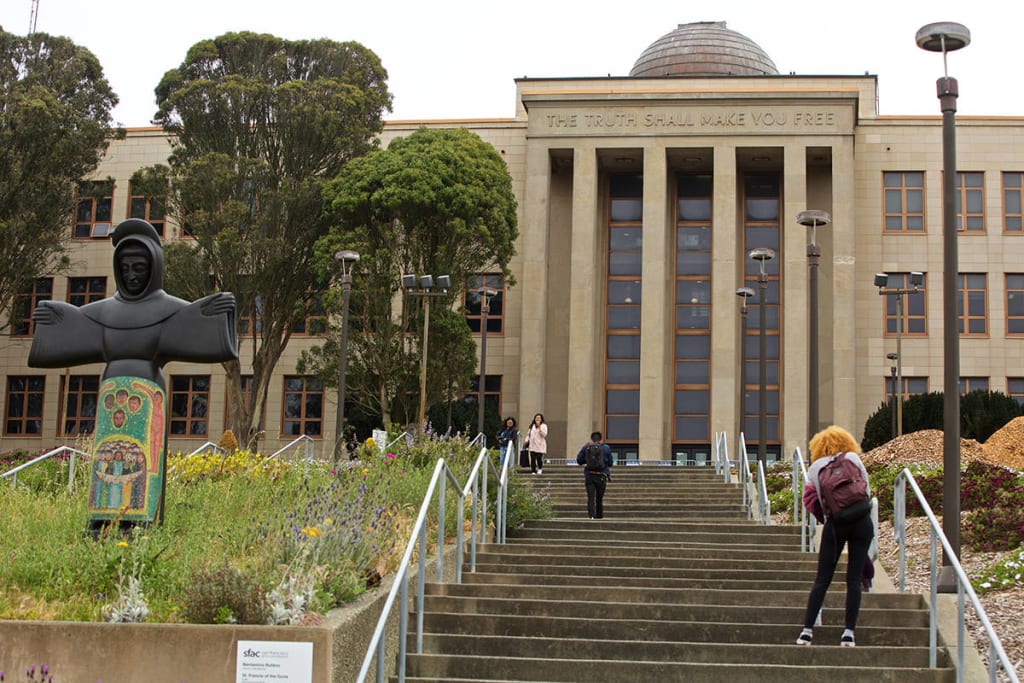
My year off left me eager to embark on my college career. I had the break I wanted and sensed an urgent need to get on with my education. I enrolled at City College, and took buses and the Ocean Avenue streetcar to the campus to register.
Mom, Dad, and I moved into my sister's townhouse in Parkmerced, not far from the campus. Sharon and Bill and my two nieces didn't need it anymore because they bought a house in Danville in the east bay.
Parkmerced is a huge apartment development bordered by San Francisco State University, 19th Avenue, Junipero Serra Boulevard, and Lake Merced Boulevard.
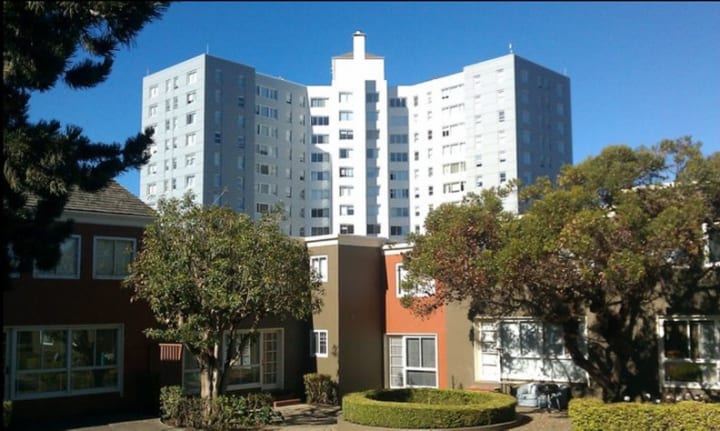
Finished in the early 1950s, Parkmerced combines massive apartment buildings with surrounding blocks of lawn and townhomes. It provides many convenient features, including carports, a parking garage and mechanic's shop, laundry rooms, street parking, and proximity to freeways and public transportation. A small strip with a Safeway and a drugstore made shopping easy.
I liked Parkmerced because of its quiet and laid-back feel, its greenery -- with its lawns, trees, and landscaping -- and its proximity to City College and San Francisco State.
The townhouses I lived in there were two-bedroom, with a large master bedroom, smaller bedroom, and bathroom upstairs; and, a large dining room/living room with parquetry wood floor, small kitchen, and coat closet downstairs. The main room's rear wall of paned windows overlooked a patio with garden beds and a hedge backing. And, the stove was gas! (I waited forty-five years for another!)
What I did not like about Parkmerced was its location in the fog belt. Many were the summer days I gazed forlornly from my patio underneath a heavy, cold, gray sky to a spot about a mile away where it was sunny.
Neither did I like the look of the sterile-looking apartment building high-rises. Nor the presence of mildew that permeated the walls of one of my townhomes, and was impossible to get rid of.
That evil crud ate away at and crumbled large sections of the exterior walls in the bedrooms and closets. It edged the metal window panes and the white tiles of the bathroom walls and floor in black gunk.
________________
Mom and I ventured to the huge Levitz's furniture store along the Bayshore Freeway in South San Francisco for an inexpensive twin bed for me. We also bought a (hideous) shelf unit made from laminated particle board and aluminum. At a lumber store, we found a piece of plywood, two wooden sawhorses and an unfinished roll top desk.
Dad made me a desk from the plywood and sawhorses that took up one wall in my bedroom. He built it on a slant, so it was effectively a drawing board. I loved sitting on a stool and studying on that thing! It was much more comfortable than a flat desk, and helped me focus.
I helped Mom prime and paint the roll top desk in a bright persimmon color. I know, what possessed her to pick that color that went with absolutely nothing?
That was one of Mom's colors, though. She once bought a persimmon-colored car!
Paradoxically, in light of how our frequent moves caused us to lose possessions, certain of our belongings found longevity. That desk was one.
After my parents no longer wanted it, I adopted it. I removed the roll top section; sanded the desk itself; covered the top and sides in black polyester fabric with narrow stripes, that looks like wool; and painted the drawer fronts black. In its current metamorphosis, it holds office and art supplies in my studio fifty years later!
________________
On the very first day I went to City College to register, I took heart from the inscription above the pillared entrance to the science building: The Truth Shall Make You Free.
This variation of Jesus' statement to believers "the truth shall set you free" is often a motto used by universities. It is also carved in stone on the old CIA building in Langley, Virginia.
I desperately wished to be free -- free of my dependency upon my parents, primarily, but it felt like there was a great deal more I wished to be free of.
Free of the limitations of childhood, I suppose. I felt burdened by painful states and memories from childhood. I wanted to feel light, and liberated. I desperately wanted to feel in control of my life.
Registration felt awfully confusing and overwhelming to me. Choosing courses so they fit into a schedule was tricky because it often happened that a course would be full by the time I found the right table to register at in the crowded cafeteria.
I had to go back to the drawing board many times before I succeeded. I decided to attend only part-time that semester because I wasn't sure I could handle going full-time.
My high school career was anything but sterling, and I felt little confidence in my academic abilities. In fact, I wondered if I were stupid, having done so poorly.
Truth was, I lost my motivation at the end of ninth grade after being yanked away from a school I loved to a distant locale in Anchorage, Alaska. I hated it there, and was miserable in my next two high schools, as well. In my sophomore and junior years I cut school more than I went.
Navigating the crowded bookstore was no easy feat, either. Many of the used textbooks I sought sold out were gone by the time I finished with registration. Nevertheless, enough of them were available that I waited in the long line at the cash register with a load of heavy books in my arms.
City College is a community college that offers associate of arts degrees in many majors. It is located at the corner of Phelan and Ocean Avenues.
An unusual program is Culinary Arts and Hospitality Studies. Students from that major could be seen scurrying around in the background of the cafeteria in their long white aprons and chef's hats. They also prepared and served lunch in the faculty dining room.
These days City College offers programs in fifty different subjects, from Aircraft Maintenance Technology and Aircraft Powerplant Maintenance Technology; to four engineering disciplines; to Radiologic Studies; to nursing; to many different languages and culture studies; to a program for older adults; and more.
Built on top of a hill, "City" provides students and faculty with lots of aerobic exercise as they climb stairways and steep paths from one building or parking lot to another!
City College was opened in 1935, in response to the need for educational and training opportunities resulting from the Great Depression. It has been an important educational institution in San Francisco ever since. As many as one in nine residents attends at any one time.
When I went to CCSF, the tuition was free, so my only expenses were fees, books and supplies. This allowed me to attend college, because by then Dad was disabled, leaving us to survive on Mom's salary alone.
One foggy morning, I trudged up the stairs and down the hallway to my first class, English 1-A. When I walked in, I was struck by the handsomeness of the young teacher who greeted me and invited me to find a seat.
From the first day, I was attracted to Dr. J. I loved his Pakistani accent, his intelligence, his dark good looks.
He seemed to be attracted to me, too. For much of the class as he sat at a small desk and lectured, he looked my direction. I fell madly in love. For the entire semester I fantasized about Dr. J.. I doubted that a romantic relationship was possible between us, given our student-teacher statuses, but I couldn't help myself.
During this same period, my relationship with my boyfriend, Vince, veered dramatically off course during a trip. We headed to Cayucos, where Vince was going to drop me off for a visit with my friend Rena and her husband and new baby.
All seemed to be fine until we were almost there, and Vince's mood suddenly shifted. His face clouded over, and he abruptly turned the car around. to go back to San Francisco. He was jealous.
I naturally demanded he stop the car and let me out. He refused, and drove until we arrived in King City, where he stopped so we could eat at a familiar coffee shop along the freeway.
I don't know why I didn't take that opportunity to tell someone what was happening. Maybe I didn't want to get him in trouble. More likely, I just wanted him to take me home.
We ate in silence, and I refused to talk to him for the entire rest of the journey.
As soon as I walked into our townhouse, I burst into tears and told Mom what happened. My relationship with Vince was over, I told her.
During the semester I looked forward to conferences with Dr. J. Our meetings were charged with desire as we talked across his desk.
On the last day of the semester, at the end of class when the other students left, Dr. J. asked me to a party he was having that weekend. Filled with anticipation, when I told Mom, she offered to buy me a dress for the occasion.
We went to Dress Barn in the Stonestown Mall, where I found a mini dress in an empire style with large black and brown flowers on a white background.
When giving Abdul directions, I told him to look for a dove in our front window. Thinking I meant a large design or actual bird, he searched and searched until finally spotting a small beige china dove on the window sill!
Mom tied the bow at the back of my dress for me, and I opened the front door when Abdul rang the bell. He graciously introduced himself to my parents, and we were off.
He drove me in his red Toyota Corona to his apartment in Bernal Heights. The small gathering included two of his male colleagues, and a couple of younger women. I felt shy and self-conscious, although everyone was very nice to me.
After his other guests left, Abdul put an Antonio Carlos Jobim album on his stereo turntable and asked me to dance. While "Quiet Nights of Quiet Stars" and "A Day in the Life of a Fool" played, our dancing segued into kissing, then love making -- while standing in front of the electric wall heater. Ha!
The more I learned about Abdul, the more impressed I was by him. He came to the US as a Fulbright Scholar, and earned his PhD in English from Case Western Reserve University in Cleveland, Ohio.
Once finished, he moved to San Francisco to teach at City College. Somewhere along the line, he married a Chinese-American friend in order to be able to stay in the country. They were divorced by that time.
Cathy was a bubbly young woman, who laughed a lot. Her energy level felt too much for me most of the time. She and a group of other grad students and faculty at UC Berkeley palled around together. Once in a while Abdul and I joined them for potluck dinners or to go out somewhere.
The group was cosmopolitan; one woman hailed from Trinidad, another from Pakistan; a man came from India.
I always felt self-conscious and shy around most of Abdul's friends. They were so highly educated and accomplished, they seemed to exist in a realm I could only aspire to.
My self-esteem when it came to intellectual achievement had suffered greatly through high school. I was just starting to realize that I actually did well in school when the subjects interested me and I no longer had to deal with high school dynamics. While my confidence was building, it was like a fledging bird that required careful tending.
________________
The first trip Abdul and I took was to Squaw Valley near Lake Tahoe. We stayed in a room at the top floor of a motel with a peaked roof and skylight. I remember lying on the bed looking up and telling myself to savor those moments.
It all seemed like a dream, this new relationship. Only, I never even imagined a man like Abdul could be interested in me. I couldn't help but feel that my magical carpet ride might end with a fall and a thump at any moment.
After twisting my knee during my first skiing attempt when I was fifteen, I never went downhill skiing. The next day I waited for Abdul on a deck at the lodge and drank hot cocoa as he skied. We waved to each other whenever he passed by.
My tenuous feeling even caused me to wonder if Abdul would leave me if I caught a cold! Really!
In truth, he cared for me well when I came down with colds or some other malady, with one notable exception three years later.
________________
Mom and Dad loved Abdul, too, as did the rest of my family. Abdul's graciousness and sociability appealed to everyone. Dad and Abdul, both intelligent, well-educated, professional men, respected and admired one another. They found many things to talk about.
Abdul and I often double dated with Sylvia and Bill, sometimes going dancing at San Francisco night spots, such as the bar at the top of the Sir Francis Drake Hotel.
The whole family often ate at the Basque Hotel on a little alley off Broadway in North Beach. The dinners were served family style on long tables crowded into the space. It was always filled with customers.
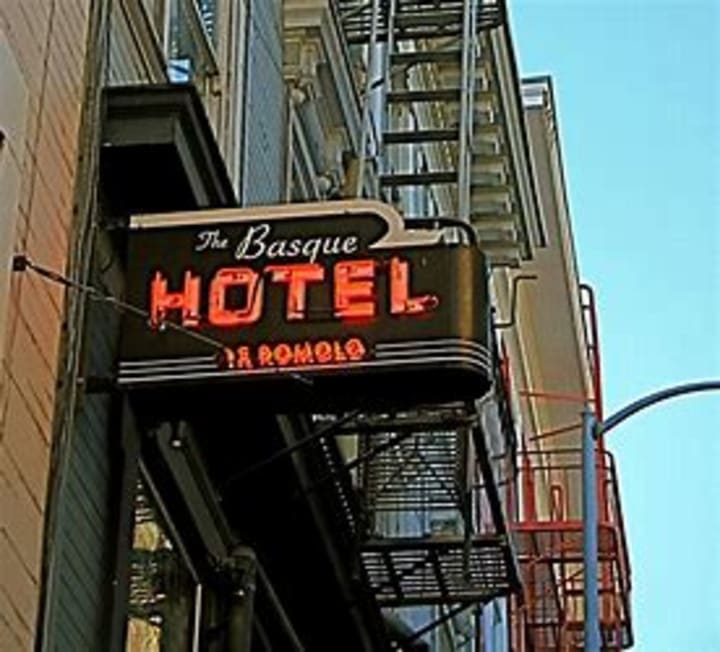
The food was plentiful and delicious. There I tasted my first oxtail stew, that rich concoction of flavorful meat in rich broth.
________________
City College attracts a cosmopolitan faculty and student body. I enjoyed that aspect, and met many students from around the world. Two of the friends I made there were immigrants: Roman, a man from Panama, and Elena, a girl from Germany.
Roman was a serious, well-built black man from Panama. He hoped to become an engineer. His feelings for a romantic relationship were not shared by me, but I enjoyed his company.
His family lived in one of the low-income projects in the Western Addition. I once visited them there. So many people crammed into one small, neat apartment!
Roman dressed in slacks, a tightly tucked-in dress shirt, and shiny leather loafers. His garb was considerably more formal than most student's or faculty's. I liked it that he took such care and pride in his appearance, but found it and him to be a little too formal for my taste.
Later on, Roman studied at Cal Poly in San Luis Obispo, and went on to have a successful engineering career.
I met Elena in English 1-A. Her round, rosy face always seemed to have a smile on it. She lived with her widowed father in a lovely house near West Portal.
In addition to Roman and Elena, I made friends with other students at City College. One was a tall young woman who stuffed her overly ample figure into tight blue jeans and a shirt.
One rarely ran into morbidly obese people in those days. Most people remained what we call slender, even skinny, today. I was a little too thin, at 120 pounds on my 5-foot 6-inch frame. I stayed at that weight until after my son was born. Until my mid-fifties and menopause, I stayed at a 130round pounds.
As a young woman, it was not that I tried to stay skinny, but that I often forgot to eat during my busy days, and I rarely ate breakfast. How I made it through until my one healthy meal in the evening is beyond me! Through a lot of college, I think I survived primarily on Snickers bars!
Two other students I made friends with were Otto and Mike. Otto was a high energy young man with a frizzy red "afro." I met him in German class. With Otto, I felt like I moved at a normal pace, while he bounded around me.
Mike was a tall, gangly guy, who wore thick glasses, and was most often seen being propelled across campus by some heavy piece of audio equipment he carried as he hurried from one place to another.
Mike studied audiovisual technologies and broadcasting, and became active in many events for which his services were needed. He wanted to be a DJ, and would have made a good one because of his deep, melodious voice.
Instead, he went to work when his father died a couple of years later to support himself, his mother, and his younger sister. Much of his career he spent with AT&T as an installation technician. In the last years of his life, he worked as a photographer, producing still and video portraits and documentaries.
Mike was enamored of me, but always respected my relationships with other men. He didn't have much luck with women. He did not exude much sex appeal, and I think his height and nerdiness kept women from being drawn to him. But, a nicer man, you would find it hard to meet.
In gym class I was approached by a girl who was looking for people to join a small folk dance performing group she was starting. I gave it a try.
We needed more men, so I asked Otto and Mike if they would be willing. The three of us became avid folk dancers as a result.
Sylvia B. was the daughter of immigrants from Croatia. She was a petite girl, who spoke crisply in a high-pitched voice. She wore glasses, and was always dressed very neatly and attractively. She taught our small group several dances from Yugoslavia.
Two sisters from Armenia taught a women's dance version of Misirlou that involved shimmies, turns, and lots of hip swaying to accompany our arm and leg movements.
For our performance in the spring dance concert, three of us dressed in short leotard tops and harem pants. Our necklaces, bracelets, and belts jangled. A head band made of coins spanned our foreheads. My waist-length brown hair swayed with my movements.
Our piece de resistance was a Croatian circle dance, or "kolo," with alternating men and women. We held onto one another's shoulders. As the dancing became faster and faster, we women allowed our feet to be lifted off the ground, resulting in our "flying." It was great fun.
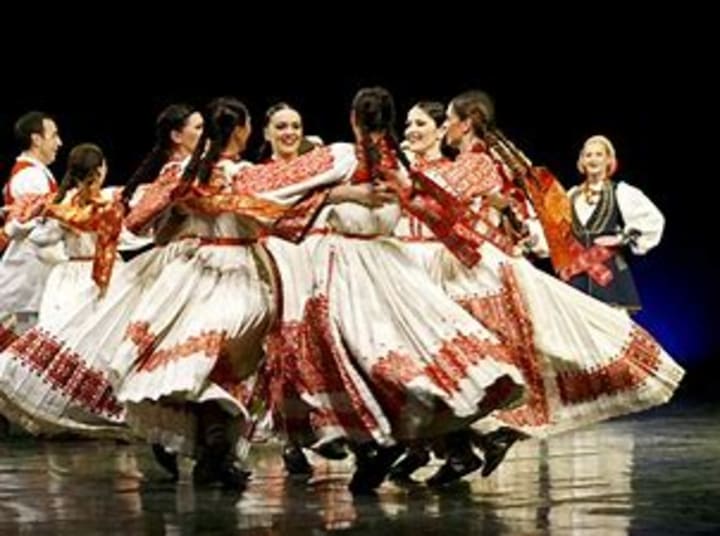
Sylvia B. borrowed costumes from the Croatian American Cultural Center, otherwise called the Slavonic Center, in San Francisco. Ours were similar to the ones shown, with, heavily-embroidered peasant-style blouses and long, pleated skirts. The men wore baggy, white garments, with black vests and leather boots.
If I were finished with my classes for the day and Abdul was still teaching, I often met him at one of his classes, where he handed me his car keys. If class was already in session, this embarrassed me immensely.
After school he and I generally took off on some errand or other. Often, we went to the main library downtown to select LPs we took home and recorded. Through that process, we developed quite a collection of classical music.
Rachmaninoff's Symphony No. 2 became my classical theme song when we lived in Cambria. An instrumental movement from Wolf Ferrari's Jewels of the Madonna became a favorite.
Abdul and I listened to other musical genres in addition to classical. I first heard Ravi Shankar's sitar music that year. We saw the movie Black Orpheus, and its theme song Orfeu Negro, also titled in some versions as "A Day in the Life of a Fool" became one of my favorite pieces.
At home, I still listened to Dionne Warwick. Johnny Mathis, too; I bought a multiple-LP set.
Mom and Dad gave me their car because they didn't need it. It was a white boat of a 1961 Chevy Impala. As I drove to and from school or work I played rock on KFRC. I kept up with the popular music of the day when I was away from Abdul. He was okay with rock, but it just wasn't his thing.
Marvin Gaye came out with "What's Going On" and "Mercy, Mercy, Me" in 1971. In 1972, James Taylor sang, "You've Got a Friend." Roberta Flack released "The First Time Ever I Saw Your Face," the Stylistics put out "Betcha By Golly, Wow," Johnny Nash sang "I Can See Clearly Now," and Cat Stevens released "Morning Has Broken."
From the main library, Abdul and I proceeded to the Safeway that stood on top of a parking garage near Potrero Hill.
Abdul usually bought chicken, which we cut up for his chicken curry, Uncle Ben's Converted Rice, and the makings for a salad.
Abdul made curry like this: into a pot went some oil, onions, and garlic; he measured an amount of curry powder into his palm and tossed that in; after a few minutes, the skinned chicken pieces and some cut up tomatoes dropped into the pot; all was browned and a little water and salt added, and the pot covered for some simmering. The rice was sautéed in onions before the water was added. Our salads were dressed with Kraft Italian Dressing. Yum.
Chicken curry was the first recipe I learned to cook successfully after Mock Apple Pie!
On Friday nights, if we weren't meeting other people, Abdul and I frequented our favorite Mexican restaurant at 19th Avenue and Clement Street, Tia Margarita.
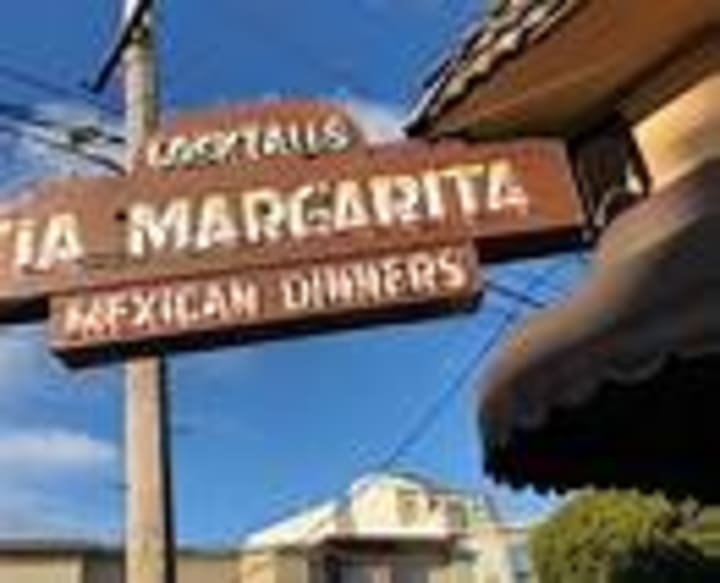
It was always worth the wait in the long line that snaked along the bar, and often onto the sidewalk. After margaritas, we ordered either Enchiladas Suizas or Carne Asada and a bottle of Cabernet Sauvignon. While waiting for our food, we talked about our days, or simply stared longingly at one another.
________________
One Saturday night Abdul and I joined another couple to attend an Indian dinner being put on as a fundraiser by a student organization at UC Berkeley. The food tasted great, and we at big servings of chicken curry.
At Abdul's place a few hours later, we both got terrible diarrhea that went on for hours. Abdul called the friend who had invited us to the dinner, and discovered that other people who ate the chicken also got sick. The pot had been left out unrefrigerated for too long.
________________
A few factors combined to cause my parents to move out of the Parkmerced townhouse. One, I was spending most of my time at Abdul's apartment, and, with Mom's encouragement, or rather, insistence, Winnie left John. Mom and Dad moved her into the townhouse.
Winnie was unable to take much with her during the brief time Mom and I helped her load up the van. We did not want to still be there when John returned. We did fit in the lovely cherry wood dropleaf table my parents gave her as a wedding present.
Winnie began drinking heavily during her miserable marriage, although none of us picked up on that fact for a few more years. We had not picked up on another very important fact when it came to Winnie, either.
A couple of years before, Winnie took me to a special education convention in Fresno. Once in our motel room, the phone rang loudly. I looked around at Winnie, and realized she did not hear it.
Alarmed, I said, "Winnie, the phone is ringing!" She looked at me with a stunned look on her face. She had a severe hearing loss and needed hearing aids. The audiologist and otologist felt that her loss was likely caused by mumps, which she had when she was six.
In other words, Winnie went all the way through school and college without being able to hear very well. Hers was an astonishing feat of adaptation; against the odds, she did well in school.
By my thirties, my own hearing loss caused me to have great trouble hearing. When seeing my patients I leaned forward and strained to understand what they said. They accommodated me graciously, and repeated themselves as many times as it took.
My hearing loss is not nearly as severe as Winnie's. I truly do not know how she did it.
There really was no viable excuse for the family's not picking up on Winnie's hearing problem. We thought Winnie was merely "spacey" when her attention drifted off.
Perhaps had we, at least Mom and Dad, paid more attention and looked more deeply, Winnie would have been spared many years of struggling to hear without assistance.
Soon after she moved into the townhouse, Winnie got a job as a nurse's aide in the same senior residence Mom worked in. Now that she lived in the city, she was able to join family excursions to movies, restaurants, and picnics.
Winnie became involved in the Women's Liberation movement that took off in the late 1960's when Gloria Steinem began to lead with persuasive force. One day she held a meeting of a group of women in the living room.
When Abdul came to pick me up and waited for me in the foyer, the women objected. "What's a man doing here?" they blurted, and not in a pleasant manner!
Some women in those early days of the movement felt angry, even hostile toward men. I did not like that about them.
________________
Mom and Dad's first move was to Fox Plaza, a new high-rise office/apartment complex at the corner of Market and Van Ness. Its name came from the old Fox Theater that stood at the site from 1929 t0 1963, the same one where my family and I saw Gone With the Wind when I was fifteen.
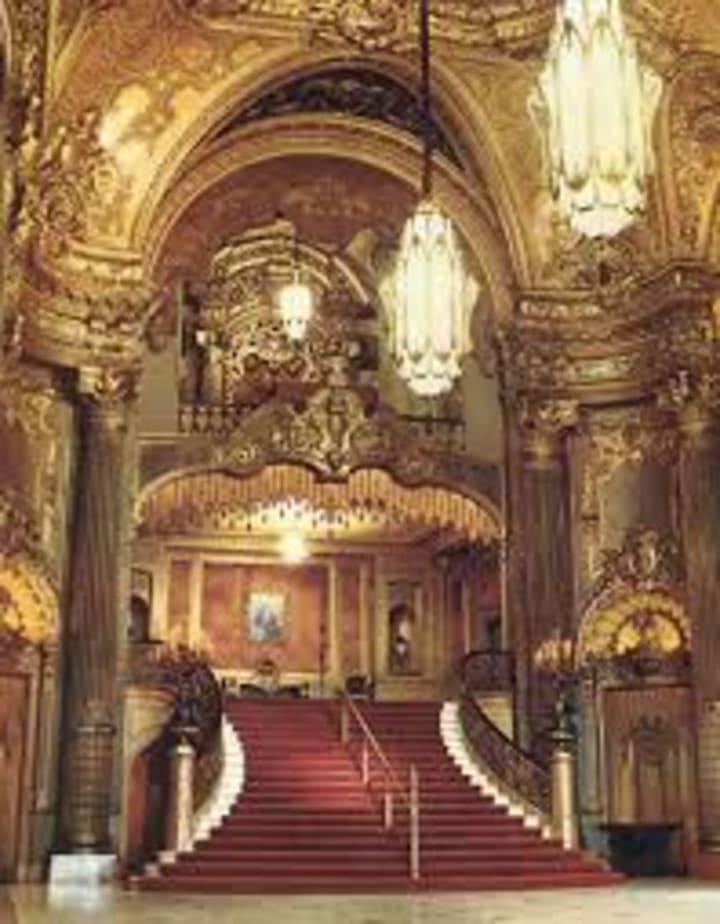
The Fox Theater in San Francisco was one of five built by the movie mogul whose name is familiar from MGM Fox, and is said to have been the grandest. Sadly, the grand old theaters lost attendance with the advent of television in the 1950s and early 60s, and most went out of business. Some can still be found scattered throughout the US.
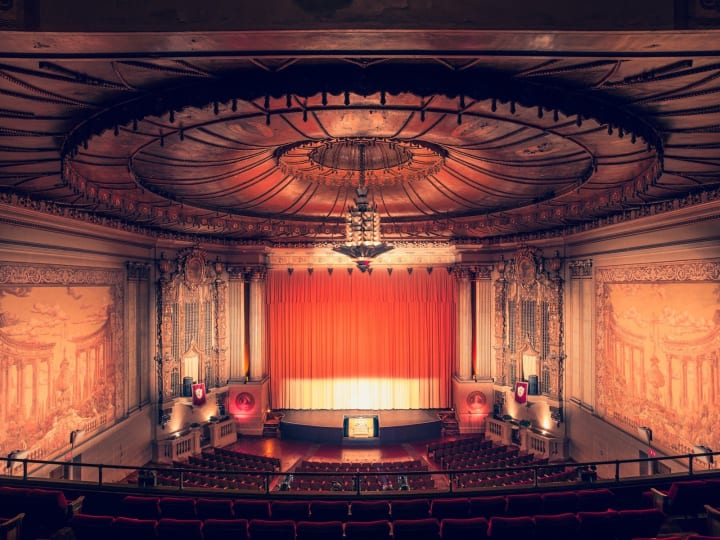
The Castro in San Francisco is one. Another, the Orpheum, is right here in Wichita.
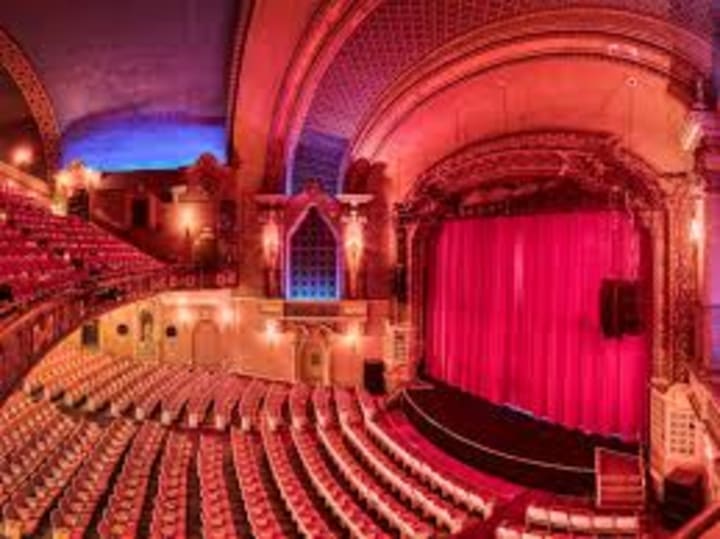
________________
Mom and Dad's apartment at Fox Plaza faced west. The view, while wide, did not thrill me. It felt too reminiscent of what I saw when I looked out our apartment's rear windows during my lonely years on Pacific Heights.
Mom went through emotional crises when they lived there. She was going through menopause, for one thing. For another, she took a job as a secretary instead of a nurse, and it did not work out well for her. I don't remember what her thinking was. Maybe she wanted daytime hours instead of the usual evening shift.
Those were difficult years for my parents due to Dad's disability, the resulting loss of his good income, and the emotional toll his not working took on his psyche. Mom was rightfully concerned about his well-being; and, the brunt of the financial burden fell on her.
Giving up or giving into depression was not in my mother's repertoire. She epitomized the good old American admonishment to "pull yourself up by your bootstraps." She demanded that of us, as well.
The difference between Mom and me in that regard was that whereas Mom invariably performed this feat with good spirits, I did not always share her good cheer and did suffer from periods of depression.
After the secretarial fiasco, she did find a job that suited her as a nurse in an upscale senior residence on Geary Boulevard near Japantown called The Sequoias.
Mom and Dad then moved to a studio apartment in The Golden Gateway, a complex of apartments, townhomes, retail, and office space built in 1967 on the site of an old produce market along the embarcadero.
Now, that was a view I could appreciate! Their balcony overlooked the bay to the north and east. The only thing that marred the sight was the old Embarcadero Freeway extension that is no longer there.

The location was really perfect for them. The complex included a Safeway market, restaurants, a dry cleaner, and just about every other convenience.
Dad always loved to be downtown in San Francisco, and we all enjoyed going to see them there. On many Saturdays Abdul and the rest of my family joined Mom and Dad at the Italian restaurant in the complex for huge platters of antipasti -- hard to come by in restaurants years later. After dinner, we headed to the theater down the way for a double bill of old movies.
This was long before Turner Classic Movies, video tapes, DVDs, and Netflix made those good old movies readily available. Back then, if a movie was not current, it was not shown in theaters except in special revivals. And those classics from the thirties and forties were not shown on television, like many westerns were.
So, having the chance to see old stars like Greta Garbo, Humphrey Bogart, and Clark Gable, and movies like Dinner for Eight, The Maltese Falcon, and Casablanca was priceless.
We young people relished that lovely opportunity to fall in love with those old stars and their movies, and Mom and Dad spent those hours in nostalgic reminiscence. I was especially struck by the beauty and personality of Greta Garbo.
I experienced a radically different kind of movie that year, as well: porno. Abdul and I were egged on by a friend of his to join him and his date at a theater on Green Street in the Marina to see Behind the Green Door.
What a crazy movie! The only image that comes to mind is of a bunch of writhing bodies on the floor of some party, and some woman dressed in a short madam's costume on a huge swing. Maybe I have the wrong movie, although since I rarely watched porno movies, maybe not.
________________
One afternoon Abdul dropped me off for a job interview at a small family-run hotel on the edge of the Tenderloin called the Oxford. I worked there part-time for the next three years.
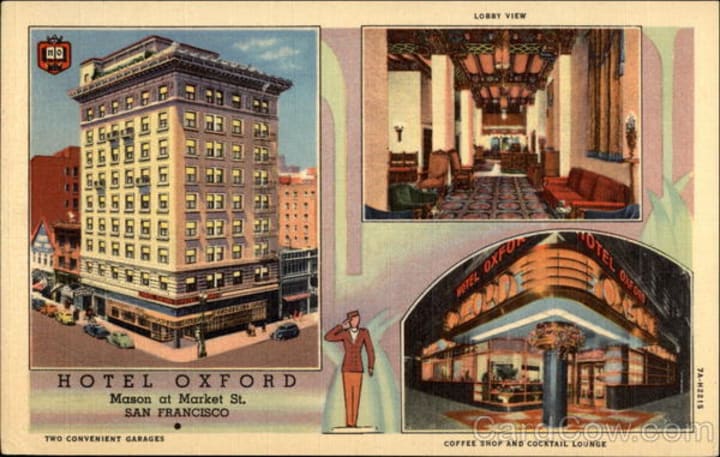
My job was to operate the switchboard that stood next to the front desk. Some of you may not be familiar with old-fashioned switchboards. The Oxford's switchboard was a large cabinet with fabric covered wires that ended in brass fittings. The fittings were inserted into circuits in order to connect calls from one room or line to another.
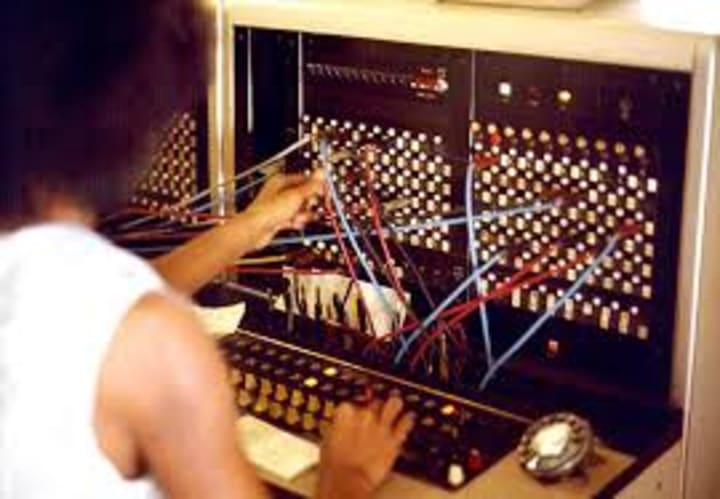
I found operating the switchboard fun, and at times stressful when too many calls came in at once. Then, I would connect to a guest's room, and say, "Just one moment while I connect your call," in a cheerful tone, field other calls in the same manner, and do my best to not get my switches crossed -- literally!
The clerks were all men who were quirky and pleasant. My favorite was Harold, an older man, who lived in a small apartment a few blocks away. I imagine he and the other clerks were quite poor, but it did not seem that way to me at the time. They generously shared snacks, and sometimes their lunch, with me.
When Harold wanted to tell me something, he leaned down confidentially and virtually whispered it. Then, he would lean back, open his eyes wide, put his curled fingers under his chin, and nod. I always expressed my astonishment and smiled.
He was the most obsequious of the clerks, and extremely nice to me. All of them bent over backwards to please the guests, as was expected.
Harold never talked about a love life, but I sensed he was homosexual, like another of the clerks was. Harold seemed to be mourning a lost love.
All the clerks wore dress suits. Lawrence's did little to camouflage his excess fat. Lawrence did talk about his tumultuous love life. It would not be for more than ten years until I learned much about the lifestyles of many of the homosexual men in San Francisco, so a lot of what he said went past me.
I knew about the Castro district, but only in the vaguest sense. It wouldn't be until the gay pride movement that began in the late sixties and the first Gay Pride Parade in San Francisco in 1970 that I began to gain an inkling of understanding.
About the extent of my knowledge when I started working at the Oxford was that it was fun to go to Finocchio's in North Beach to see the female impersonators. Were those guys convincing -- and talented. Not all of them were homosexual, but we didn't know that. It wouldn't have mattered, anyway.
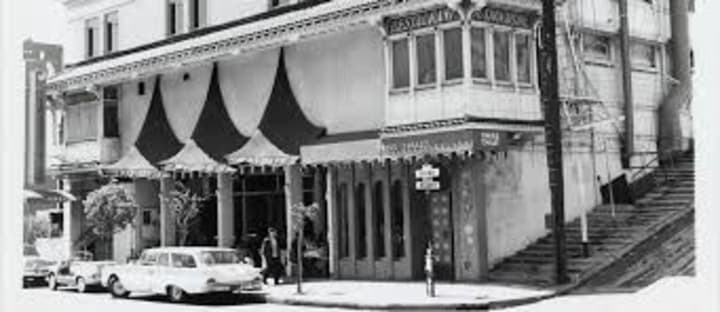
Let me tell you a bit about Finocchio's. In its early history, it was a speakeasy called the 201 Club that opened in 1929 on Stockton Street in reaction to prohibition. When prohibition ended in 1933, the club moved upstairs and began female impersonator acts. In 1936 it moved to Broadway along the nightclub strip of North Beach due to police raids.
"Joe" Finocchio, the co-owner, came up with the idea of offering the acts after one of his patrons got up and amused others with his imitation of a woman. The audience loved it, and Finocchio's, as it was later known, was born.
From the beginning to its closing, Eve Finocchio, Joe's wife, answered the phone with, "Forget your troubles and woes and join us at Finocchio's, family-owned since 1936."
The club became one of the rare places homosexuals could go out in public to socialize. Prior to 1976 same-sex sexual activity was illegal in California.
Homosexual men, with nowhere else to find partners, often went to public restrooms, and were frequently arrested. Gay bars existed, but remained secretive, sometimes disguised behind plain, locked doors.
Many of the acts at Finocchio's were inspired by other cultures. A geisha-style act, for example, may have encouraged Japanese tourists. In any event, Finocchio's attracted people of many cultures and races, and this was highly unusual during the segregated eras.
The performers needed to be talented in many ways. They had to sing falsetto well, and do all the other things necessary to convincingly impersonate women. Even as a woman, I would have found it nigh near impossible to walk in stiletto heels! Some of them even incorporated strip tease into their acts!
Marilyn Munroe, Judy Garland, and Barbra Streisand were among the famous movie stars and singers imitated at Finocchio's before its final closing in the early 1990s.
In fact, Finocchio's was a stop on one of the popular tours the clerks sold to our hotel guests! Huge, shiny silver, Greyline buses stopped outside in the early evenings to take them on a tour of San Francisco after dark.
________________
For lunch at the Oxford, I often passed through the door leading into a German hofbrau next door for a fat hot pastrami sandwich on a roll or a plate of corned beef. If I didn't want to spend the money and forgot my lunch, one of the bellmen, a sweet Filipino man, shared his rice with me.
That was the best rice I think I have ever had. I have never been able to reproduce it. It seemed to be simply fried rice with mixed frozen vegetables and tiny pieces of chicken. Whatever his wife did, it was absolutely scrumptious!
________________
On sunny days, I took my lunch and a textbook up to the roof of the hotel, where elements of the ventilation and heating systems were housed in metal boxes.
Because of the weather in Parkmerced and City College during the summer -- cold, windy, damp, and foggy, I felt sun and heat-deprived much of the time, and welcomed the chance to revel in the sun on the Oxford's roof.
The only danger that loomed was that of falling asleep, especially on those dreadful days when I worked split shift and had hours to wait until evening.
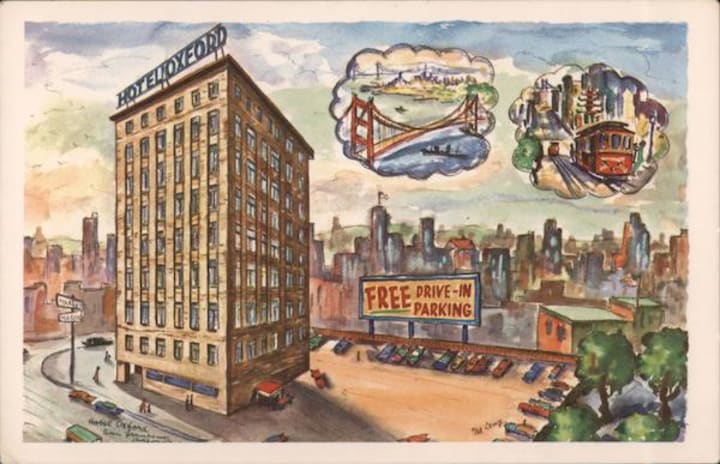
The Oxford Hotel's location stunned many guests when they arrived. The hotel stood on a corner that met three streets: Market, the main thoroughfare where the street cars and BART run; Mason, and Turk. The problem was Turk Street.
Turk spans several blocks of the Tenderloin, a traditionally unsavory area of downtown characterized by brothels, transient hotels, drunks, and, by the time I worked at the Oxford, both female and male prostitutes soliciting on the sidewalks.
The most shocking aspect of life on Turk Street as it affected me and the hotel guests, was the presence of male prostitutes -- young men, often scantily clad, who stood across the street trying to drum up business with lewd hip movements and hand gestures. They did not do much to counteract the cultural stereotypes of homosexual men as "filthy degenerates."
Our bellmen regularly chased them off our side of the street, and called the police on the ones across; but, it seemed there were always more to take the places of those shooed away, one way or another.
"What's a nice girl like you doing working in a place like this?" greeted me on a regular basis from some earnest face leaning forward across the front desk. With arm subtly waving toward the plate glass windows, the sincere lady added confidentially, "Doesn't it frighten you to work here?"
The clerks and I were quick to point out that despite our location, we remained a safe, family-oriented hotel; the staff watched out for my welfare.
They did, too. I was allowed to park my car in the gated parking lot, and someone escorted me to my car at night.
Not all of the Tenderloin's history is seamy. Established as a residential neighborhood following the Gold Rush, it appears to have led life on the up and up into the 1890s, offering theaters, restaurants, and hotels for those interested in nightlife.
It must have been the opening of Tessie Wall's brothel on O'Farrell Street in 1898 that began to stain the Tenderloin's reputation.
Even so, the neighborhood was rebuilt with hotels and apartment buildings after the Great Earthquake and Fire in 1906.
The Tenderloin's fate was sealed, however, with the Red Light Abatement Act's coming into enforcement in 1914. The act prohibited commercial operation of not just brothels and those bathhouses where prostitution or activities likely to result in transmission of disease were allowed, but also gambling establishments.
The red-light district's dance halls, bars, jazz clubs, concert saloons, variety shows, and brothels were chased from the Barbary Coast, an area closer to the docks, into the Tenderloin.
The area's tarnished reputation, however, did not prevent it from becoming an important venue for musicians and other performers in the mid-20th century.
The Musician's Union Building was established on Jones Street. A famous jazz club called the Black Hawk at Hyde and Turk Streets hosted Dave Brubeck, Miles Davis, Thelonious Monk, Gerry Mulligan, and other great jazz artists during the late 1950s and early 1960s.
Incidentally, some of what made my sophomore semester at Sunset High so miserable was that I had to catch the bus in the early morning in the Tenderloin. There I stood at a bus stop amidst remnants of the night's denizens passed out prone or lurching drunkenly by.
Sometimes on a weekend when I worked split shift, Abdul picked me up for an excursion. One day we joined Sylvia and Bill for a tour of the Haas-Lilienthal House on Franklin Street.
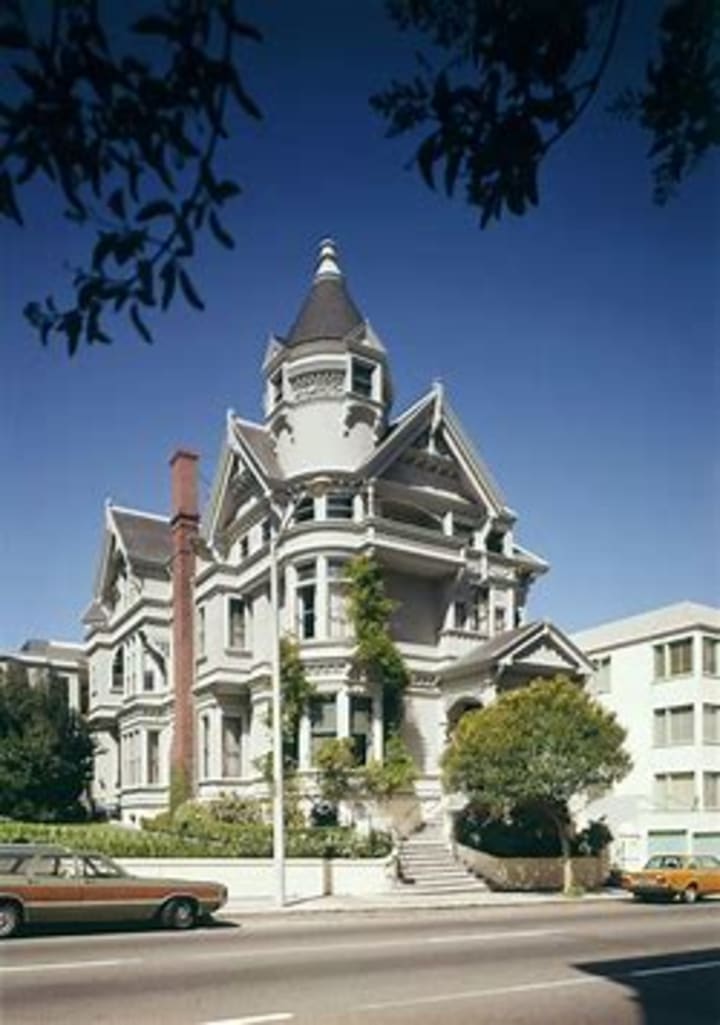
What a place! The house was built in 1886 for William Haas and his wife Bertha Greenebaum and their three children. The Haas's were part of the prominent Jewish community in San Francisco.
William emigrated from Bavaria and established himself as a mercantile business owner. Bertha's family also came from Bavaria.
Lilienthal was the name of the couple's youngest daughter, Anne's husband. I can find no information on him except that he was a prominent businessman.
The house was designed by a Bavarian architect in a fusion of the Stick-Eastlake and Queen Anne-styles. I am not sure how these styles blend and distinguish themselves in the house, but the house seems to me to have a sharper, more angular outline than a typical Queen Anne.
Both styles are asymmetrical, and feature steep roofs. A distinguishing feature of a Queen Anne is the existence of a turret or turrets and more rounded features than a Victorian.
Many of the interior living areas are paneled in redwood finished to look like oak.
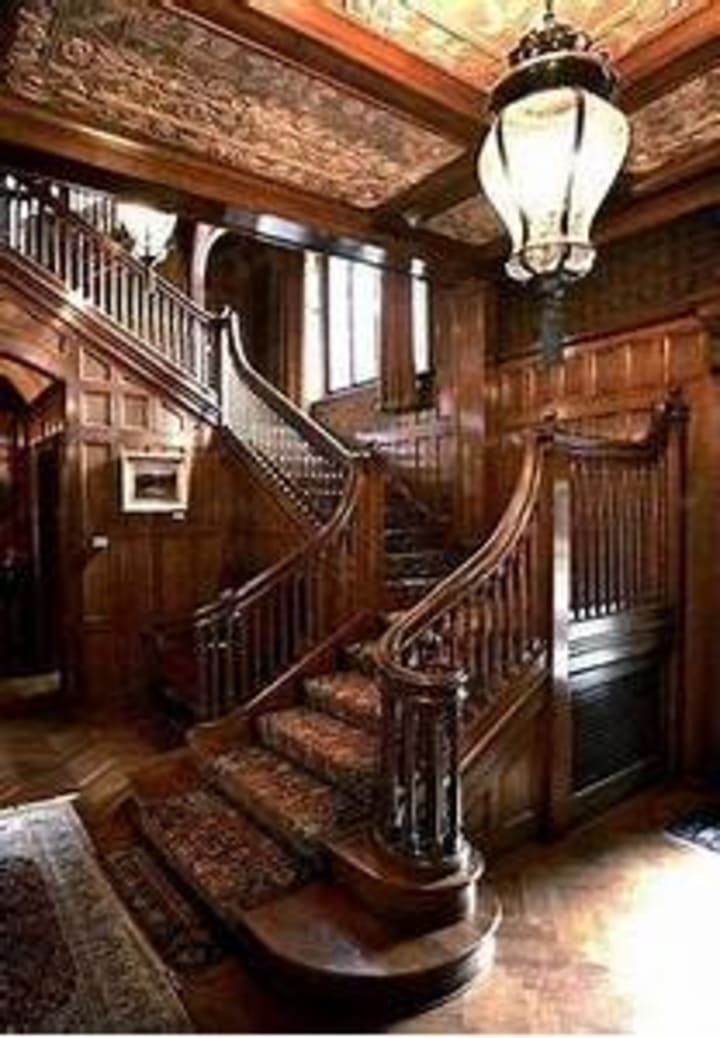
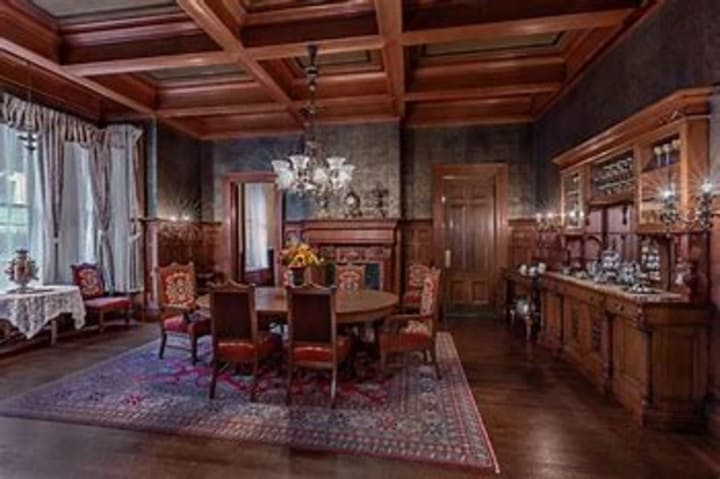
An interesting detail is that the bathroom features a bidet, something that the couple incorporated into the design because they liked that European feature.
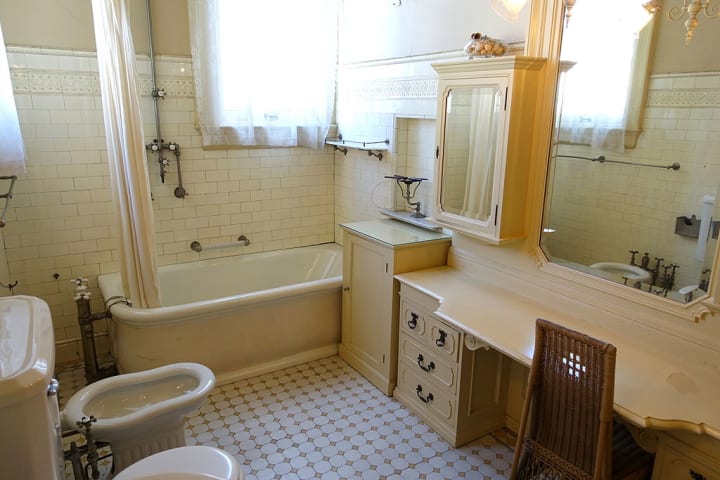
________________
The Oxford was owned and operated by Mr. H., whose father established the hotel and passed it down when he retired, and his brother-in-law, Mr. W.
While the two men were gracious enough to me, they rather lorded over us the lifestyles their wealth afforded them. I did not appreciate that. I felt they were insensitive to the fact that we peons might have some feelings about the big bucks they raked in light of the measly ones we did; and about how hard we worked for the pennies they threw our way while they told us about their play time.
Mr. W. talked incessantly about "the ranch," a vast property he and his wife owned in Marin County -- the family barbecues, the trips, the hunting parties, the planned acquisition of ever more horses, more acres, more vehicles...
Mr. H. passed his obnoxiousness onto his son, who worked as a bellboy and was being groomed to take over his share of the business one day. Problem was -- as far as I could see -- that junior possessed none of the smarts his father might have -- it was hard to detect how many existed -- and none of the savvy.
Does my assessment sound unfair, even petty? Let's just say, while working in the hotel, I gained an appreciation for why peasants world over have organized rebellions! Fortunately, the hotel was just a minor part of my life.
Just one more thing, though: the owners did not spare me their prejudices, either. Both Mr. H. and Mr. W. let it be known that they felt Abdul did not meet the proper WASP standards they felt I deserved. They wondered aloud how my parents allowed me to date a man from another (inferiority implied) country.
________________
My busy schedule and my involvement with Abdul kept me from doing much with Dona. We drifted apart a bit that year.
Dona worked downtown for Pacific Bell as an operator, and lived with her boyfriend, a Filipino-American young man also employed by the telephone company. The two of them were into astrology and metaphysics of some sort. I had no problem with that, but the subjects held little interest for me.
Dona sometimes acted overly silly. Years later she came to recognize and understand this as part of a syndrome called Pseudobulbar Affect, or PBA, a neurological condition. People with PBA sometimes laugh or cry inappropriately, expressing more intense emotion than they actually feel.
While we always maintained our friendship, during my City College years, Dona and I did not get together much. She had her sphere and I had mine. Abdul seemed uncomfortable with her, so we rarely did anything together.
Much of what preoccupied Dona had to do with office politics and her feeling mistreated by her boss. I tried to be supportive, but could not drum up much interest. We operated in different orbits, and seemed to have little in common anymore, besides our history.
________________
For Christmas, we all crammed into Mom and Dad's studio in the Golden Gateway.
Mom and I never failed to embark on a flurry of last-minute gift buying and wrapping every year. It was fun to work downtown during the season and to have my own money to purchase gifts with.
Neither of us was good at finishing up these tasks in time for Christmas. Invariably, Mom and I spent Christmas Eve and much of Christmas Day frantically wrapping.
Winnie, Mom, and I took great pride and pleasure in wrapping our gifts creatively. A favorite technique that Mom came up with was to cut out designs from the wrapping paper -- Santa, trees, sleds, reindeer, and so on -- and use them to enhance the designs on the package with their 3D effect.
We never simply slapped tape on. We carefully finished each seam by turning the paper under, and sealed it invisibly by making a roll of tape with the sticky side out and attaching it to both sides.
We employed ribbon in various attractive ways. On some packages we wrapped the ribbon diagonally across two corners, then added a bow, either purchased or constructed by looping the ribbon into interesting shapes.
On other packages, we tied strands of thin ribbon together, then drew them quickly against the open edge of a scissor blade to curl the ends.
Bill's sister Beverly joined us that year, as did her mother, Doris.
Doris was a petite, slender, middle-aged woman with a bit of a hump from osteoporosis, something that little was done about in those days. She always dressed nicely, her outfits complete with a coordinating scarf.
Doris had been banished from her kids' lives for several years when Loren took them to Emma's house in St. Helena. At the time, she was suffering from severe alcoholism and depression. Beverly was too young to remember much about living with Doris, but Bill used to describe some severe neglect issues and parental conflict.
I remember how Bevy anticipated her mother's first visit at age nine or ten when Emma allowed Doris to meet her in St. Helena that summer. Doris had been made out to be a terrible, dangerous woman, but Bevy wanted to see her, nevertheless, and was relieved to meet a caring mother.
Doris was in and out of treatment in Napa State Hospital for many years. She successfully quit drinking, and made a life for herself as best she could. Mom and Dad sometimes helped her out financially and/or tried to connect her with a job.
I always liked Doris. I admired her courage and perseverance. I enjoyed her subtle wit. She was always kind to me.
Over Bevy's late childhood and teen years, she and Doris forged a close relationship. Doris often sent poetry to Bev, to me, and to my sisters. We kept up a letter correspondence for many years.
________________
Toward the end of the spring semester, Abdul and I embarked on shopping expeditions for gifts for his many family members in Pakistan. He was to leave as soon as school ended to spend the summer there.
He and I spent quite a lot of time in the Stonestown Mall Emporium pawing through tables of men's dress shirts and slacks on the main floor as he consulted the list of sizes for each person. We also selected tiny fancy dresses, cotton dress shirts, and shorts upstairs in the children's department. Colognes and perfumes were chosen as gifts for family friends and relatives.
Abdul, as elder son of deceased parents, felt strongly the responsibility for his younger siblings. His older sisters were already taken care of by their husbands; one of his younger sisters was married; but, the youngest was not. Abdul was heading back to try to find her a husband.
On warm days Abdul and I often went to Baker Beach, with its wide sands. Baker Beach is close to the Golden Gate Bridge, so the view is wonderful from there.
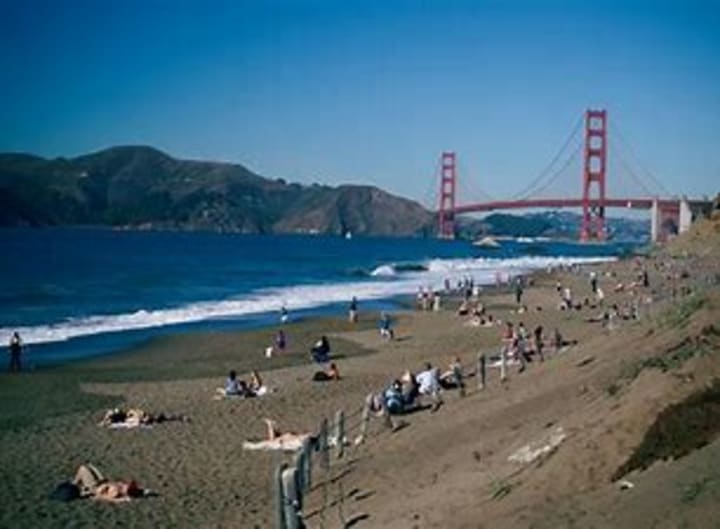
We drove across the bridge to the Marin Headlands. What a gorgeous place!

The road winds through and around to the west side, with its view of the Pacific. Along the way one can spot rock formations, tiny beaches, seagulls (of course!), ships heading out from the bay.
Another excursion was to the Marin Headlands. What a gorgeous drive!

The views are spectacular. From there you can see the Golden Gate Bridge and San Francisco in the distance. Around to the west side ships heading out of the bay are visible. Rock formations, tiny beaches, and lots of seagulls, too, of course.
The road winds around until it meets another road that winds down to Sausalito. Sausalito is on an inlet of the bay with a quaint downtown, houseboats docked along, and a view of Tiburon.
It's fun to explore downtown with its small shops and seafood restaurants over the water.
Tiburon is something of an island. Fancy and expensive houses stand along the shore on both sides. A road winds around until you reach downtown, with its quaint shops and restaurants, where you can catch a lunch or drinks on piers over the water.
When I was in grad school I had the opportunity to visit a house on the east side. Wow, was that something! Huge, descending its floors down the steep hill to the bay. From there one can see Point Richmond to the east, and the Bay Bridge to the southeast.
That spring, Abdul sponsored his younger brother, Khaliq to come over from Pakistan. Khaliq was of a sturdier build than Abdul, and had not received a university education. He arrived shortly before Abdul was to leave so he could enroll in training to become a car mechanic.
The plan was for Khaliq to become employed and settled in before his wife and three little boys joined him here.
With so little time for Khaliq to adapt before Abdul left, some of his cultural orientation fell to me by default. Poor Khaliq dissolved into a sorry state of culture shock, something I would come to understand a couple of years later. And, he missed his family terribly.
When I took him groceries and supplies, he seemed to reach for my friendly face as if to a life buoy. I spent as much time with him as I could manage, but felt inadequate to the task. We communicated the best we could from our Punjabi/English divides.
Khaliq had a broad, expressive face, and used his heavy, dark eyebrows to communicate a great deal. We both used a lot of hand gestures, naturally. I could tell he appreciated my efforts, and made every effort to look less miserable around me.
The image that stays with me most from that summer is of sitting along a cliff above the ocean near Point Reyes one evening. I am spanning the earth in my mind to make a connection to my longed-for love. I look to the soft midnight blue sky, to the moon, to the stars, and I pray that Abdul is feeling me from halfway across the world.
While Abdul was away, he let me use his car instead of my old clunker. One day I washed it with dish soap! To my horror, it took the shine off the car. I was so afraid of how Abdul would react, but he never mentioned it.
I took it upon myself to clean Abdul's apartment from top to bottom. The bathroom fixtures became shiny, the bedspread neatly made, the living room picked up, and the kitchen spotless.
After he came home, one evening when we sat down for dinner at his Formica and aluminum table. My skirt was long, made of fluid black polyester. Abdul said, "Thank you for cleaning the floor." I was glad that he noticed. But then he said, "Your skirt sweeps very well." I was dismayed and hurt.
Soon school started, and we went back to our routines. It proved to be another eventful year, full of love, study, family gatherings, and dinners at the Basque Hotel.
About the Creator
Caroni Lombard
As a child my family moved often. In my story, I share that experience; what it was like and how we coped.
But my story is not just for those who share my experience of growing up in a highly mobile family. It's for anyone who's human.

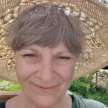
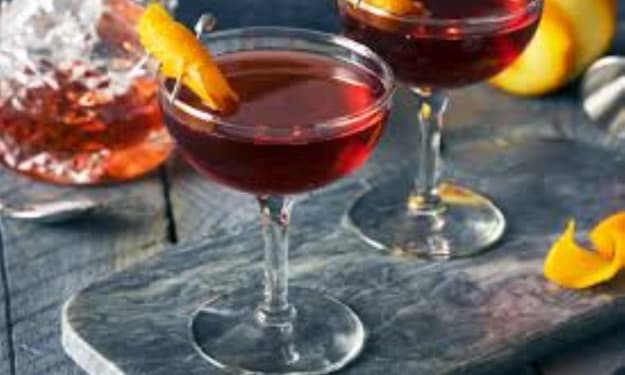

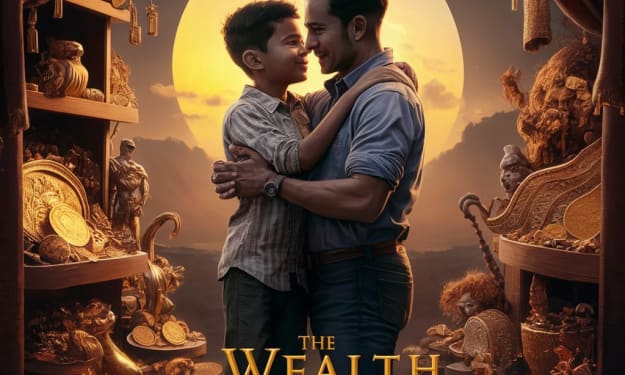

Comments
There are no comments for this story
Be the first to respond and start the conversation.